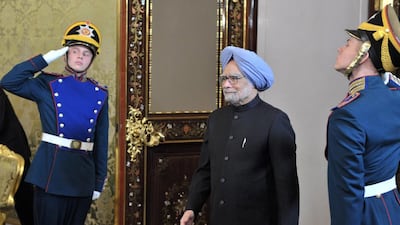NEW DELHI // Prime minister Manmohan Singh left Moscow for Beijing on Monday, failing to make progress on a nuclear agreement with Russia but hoping to sign a border deal with China.
Mr Singh, whose trips to two of India’s most important regional partners were likely his last as premier, hoped to secure a deal for Russia to supply two reactor units for the Kudankulam nuclear plant in Tamil Nadu.
Legal experts from both countries had worked to clear up several clauses, including a crucial one on who was liable in case of a meltdown, in time for Indian and Russian nuclear agencies to sign the deal during Mr Singh’s visit.
But while the fine print prevented that from happening, Indian officials said the liability clause would soon be cleared and that much of the text of the final deal has found mutual agreement.
In a joint statement, Mr Singh and the Russian president Vladimir Putin said the two countries had “agreed to expeditiously finalise” the deal for the plant, which India needs to meet surging electricity demand.
Mr Singh, speaking at the Moscow State Institute of International Relations, did not allude to the Kudankulam deal, beyond saying that he saw Russia as “a key partner for our energy security”.
Instead, he spoke more about defence ties between the two countries.
India bought nearly 40 per cent of its defence purchases from Russia between April 2010 and March this year, and Mr Singh said he appreciated Russia’s position as a long-time supplier of defence technology.
But he said: “Our future defence partnership must be increasingly based on technology transfer, joint ventures and co-development and co-production.”
India has been looking to lease a second nuclear submarine from Russia. The first such submarine, INS Chakra, was leased for 10 years in April 2012, for US$1 billion (Dh3.67bn). India wants Russia to upgrade four diesel-electric submarines and rent several more.
In Beijing, Mr Singh will attempt to finalise a border-cooperation agreement that will quell tensions between India and China over their shared border.
The agreement, in the works for many months, is intended to forestall possible confrontations between troops across a disputed 4,000-kilometre stretch of the border, of the sort that occurred this year.
In April, in the Ladakh region in Kashmir, 50 Chinese troops crossed 19km over the border into India. A 21-day standoff followed, ending only after diplomats negotiated a compromise and the Chinese troops returned home.
Since that standoff, Mr Singh said before his departure from India, the two countries have made “preliminary progress towards settlement of the India-China boundary question”.
The border-cooperation agreement, for instance, was also to have been atop the Chinese premier Li Keqiang’s agenda when he visited New Delhi in May. But Indian officials said at the time that their Chinese counterparts never responded to their latest draft of the agreement.
In the interim, the Indian army has registered at least three further incursions by Chinese troops into Indian territory in Kashmir, each lasting a day or less.
Srinath Raghavan, a Delhi-based historian and defence analyst, told The National that even a new agreement would only be an incremental addition to previous border accords signed in the 1990s.
“The agreement represents just one more level of border management,” Mr Raghavan said. “It isn’t about lines or maps or territory. It just involves additional measures to stabilise things.”
Disagreements persist about some of the confidence-building measures that the two sides have proposed.
When India suggested a hotline between the Directors General of Military Operations on either side, for example, China responded that its army holds no such rank or designation.
China has also signalled its reluctance to discuss a water-sharing accord on the Brahmaputra river, which flows through Tibet and into India’s eastern state of Arunachal Pradesh.
“India expects to put more pressure on China by exaggerating the facts and drawing attention from the international community, with the intention of preventing China from developing Tibetan water resources,” an article in Beijing’s Global Times, written by a researcher from a state-run think tank, said this month.
ssubramanian@thenational.ae

